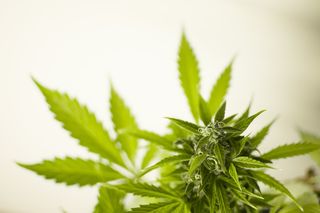
CBD
CBD Oil for Mental Health—Should You Take It Too?
Is this supplement simply snake oil, or is it actually good for mental health?
Posted January 7, 2019 Reviewed by Lybi Ma

About 20 percent of the population suffers from some form of anxiety. If you have anxiety, you may be looking for a new way to relax your body and mind. Many of my patients and followers on Twitter and Facebook have reached out to ask me whether CBD oil is the newest snake oil, or whether can it really help ameliorate symptoms of anxiety without causing side effects.
What is CBD oil?
Cannabidiol (CBD) oil is a natural plant-based oil that contains phyto (plant) chemicals called cannabinoids. Cannabinoids are “feel good” molecules naturally made by the body when we are feeling relaxed and secure or involved in something that makes us happy, like hugging someone we care about or sitting down to a meal we are looking forward to. Cannabinoids are also released when we sleep well and exercise. Cannabinoids bind to little docking stations in our bodies called cannabinoid receptors that help stimulate those feel-good responses. Discovered in 1992, the main cannabinoid molecule is called anandamide, which is translated from the Sanskrit as "bliss molecule."
The cannabinoid system is key to helping the body keep itself in balance. This system ensures our stomach and intestines run well, keeps inflammation down, and modulates pain while helping to maintain our mood in a good place. Research suggests the cannabinoids from CBD can stop the breakdown of anandamide. When we retain more anandamide in our body, there’s more bliss.
Will CBD oil make me high, like marijuana?
No, it will not. I tell my patients if you are looking to feel high, then you will be disappointed. Supplemental CBD oil comes from the hemp plant. Hemp is a cannabis plant and a close cousin of marijuana. However, CBD from hemp has practically no tetra-hydro-cannabinoids (THC). THC is the substance in marijuana that has psychoactive effects and can give you a high. In fact, a number of studies on CBD showed that CBD itself can counter the negative effects of THC—including appetite issues, weight gain, and paranoia.
Is CBD oil legal?
CBD that comes from hemp is legal in all 50 states. As I mentioned in the last paragraph, CBD has no effective amount of THC. There is a tiny bit, but it is not enough to cause any psychoactive effects. As a result, there are none of the legal concerns associated with marijuana.
Is CBD effective for mental health challenges?
For decades, the World Health Organization’s expert committee on drug dependence has offered a long list of conditions that CBD may benefit. Research studies on both animals and humans have shown that CBD may help lower feelings of isolation, relieve autism symptoms, and reduce the effects of post-traumatic stress disorder (PTSD). It seems CBD can calm the brain and support the hippocampus, which is a brain area important for healthy emotion and memory.
One study showed CBD could reduce social anxiety in a way comparable to ipsapirone and diazepam (valium). A 2012 double-blind, randomized clinical trial looked at the benefits of CBD for psychosis. In this study, 40 volunteer patients were given CBD or an antipsychotic. Both treatments helped patient symptoms equally, while the group taking CBD enjoyed many fewer side effects and no problems with movement, weight gain, or hormonal dysregulation—all common side effects of antipsychotic medications. A version of CBD oil was just studied for its benefits in childhood epilepsy—and will now be released as simply a CBD oil.
Is CBD safe?
CBD seems to be exceedingly safe. In fact, the FDA-approved use of CBD in epilepsy was studied in children, which suggests both kids and adults can use it safely. While it has effects on relaxing the body and helping with pain, CBD does not suppress the breathing centers of the brain the way opioid drugs do, which is why there is not the concern, even in overdose, that you would have for pain-killing drugs.
Since the 1960s, medical research has collected research supporting the safety of CBD. Typical doses of 10mg to 100mg a day show no negative effects. Even one study where patients took 1,280 mg a day did not see a problem. The director of the National Institute of Drug Abuse has stated that CBD oil is safe, and recently the FDA approved CBD oil for use in children with epilepsy.
I have been working with CBD in my practice for about two years and have not seen a problem. Sometimes, when patients get more relaxed, it can give them a strange sensation. Understandably, that can be concerning to patients who are not used to feeling calm.
Please note that, because of the way the liver works, CBD may affect the clearance of other drugs you are taking. As always, it’s a good idea to check with your doctor before starting any new herbal supports, especially if you are taking prescription medications.
Can CBD oil cause a positive result in a drug test?
Since CBD has practically no THC, there is, in theory, little to no chance it will create a positive drug urine test. And, the follow-up confirmatory test for marijuana is too specific to come up positive from CBD. Having said this, it is important to purchase CBD from nutraceutical companies who manufacture it from varieties of hemp containing the lowest THC.
If you are not sure, and this issue could be a problem for you, you may not want to risk it—or talk to your employers about CBD oil first, before using it.
How much CBD oil should I take?
I usually recommend that patients start with 15mg of CBD once or twice a day. This oil is best taken with food. Instead of self-prescribing, I strongly recommend you work with a practitioner knowledgeable in natural medicine who is experienced with CBD, especially if you are taking other medications and/or if you have mental health symptoms that could be severe.
How about the CBD beverages and foods that are so popular?
Right now, many companies are trying to fill their shelves with CBD-infused products. My guess is that the vast majority of these are not of good quality and may contain little to no CBD. If you are going to use CBD oil as a supplement for mental health, ask your practitioner for a high-quality version that you can take in a prescribed dosage. Don't try to get it through other products where the amount and quality are not well understood.
Remember: General anxiety support
In my books, I always recommend not simply taking supplements for anxiety, but making dietary and lifestyle changes and adopting stress-relieving rituals and therapies to bring full healing to your body. Also, visit with your doctor regularly or when issues pop up. While CBD is a very good supplement, I find its power is enhanced when combined with natural modifications.
For a more thorough look at the research and references, please see my academic review on CBD here.
References
research cited:
Beale C. et al. Prolonged Cannabidiol Treatment Effects on Hippocampal Subfield Volumes in Current Cannabis Users. Cannabis and Cannabinoid ResearchVol. 3, No. 1. Published Online:1 Apr 2018
Bongiorno PB. CBD for Mental Health. Naturopathic News and Reviews. in press.
Crippa JA, et al. Neural basis of anxiolytic effects of cannabidiol (CBD) in generalized social anxiety disorder: a preliminary report. J Psychopharmacol. 2011 Jan;25(1):121-30
Croxford JL, Yamamura T. Cannabinoids and the immune system: potential for the treatment of inflammatory diseases? J Neuroimmunol. 2005 Sep; 166(1-2):3-18.
Dasgupta A. Chapter 10. Laboratory methods for measuring drugs of abuse in urine. in Alcohol, Drugs, Genes and the Clinical Laboratory An Overview for Healthcare and Safety Professionals. Academic Press. 2017, Pages 167-191
FDA approves first drug comprised of an active ingredient derived from marijuana to treat rare, severe forms of epilepsy. https://www.fda.gov/newsevents/newsroom/pressannouncements/ucm611046.htm accessed on August 13, 2018.
Hahn B. The Potential of Cannabidiol Treatment for Cannabis Users With Recent-Onset Psychosis. Schizophr Bull. 2018 Jan 13;44(1):46-53.
Leweke FM et al. Cannabidiol enhances anandamide signaling and alleviates psychotic symptoms of schizophrenia. Transl Psychiatry. 2012 Mar 20;2:e94. doi: 10.1038/tp.2012.15.
Lewis M. CBD for Head Trauma. Integrative Medicine for Mental Health. Presentation. September 2018. Dallas, Texas.
McGuire P1, et al. Cannabidiol (CBD) as an Adjunctive Therapy in Schizophrenia: A Multicenter Randomized Controlled Trial. Am J Psychiatry. 2018;175(3):225-231.
https://herb.co/marijuana/news/cbd-psychosis-schizophrenia accessed May 22, 2018
Martin-Santos R, et al. Acute effects of a single, oral dose of d9-tetrahydrocannabinol (THC) and cannabidiol (CBD) administration in healthy volunteers. Curr Pharm Des. 2012; 18(32):4966-79.
Perucca, E. Cannabinoids in the Treatment of Epilepsy: Hard Evidence at Last? J Epilepsy Res. 2017 Dec; 7(2): 61–76.
Thompson, D. CBD Oil: CBD Oil: All the Rage, But Is It Safe & Effective? https://www.webmd.com/pain-management/news/20180507/cbd-oil-all-the-rag…
Zuardi AW, et al. Cannabidiol monotherapy for treatment-resistant schizophrenia. J Psychopharmacol. 2006 Sep; 20(5):683-6.



